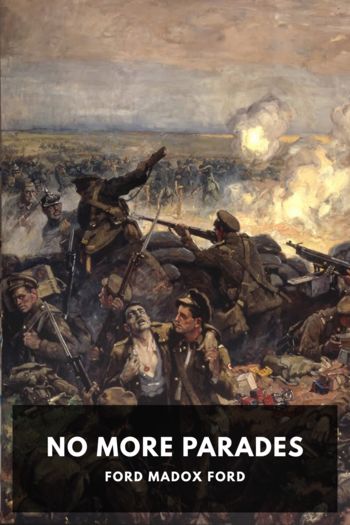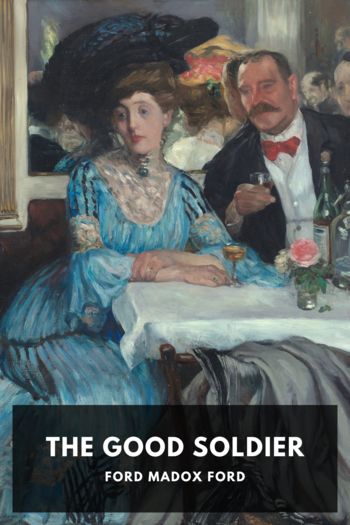Some Do Not … by Ford Madox Ford (story read aloud txt) 📕

- Author: Ford Madox Ford
Book online «Some Do Not … by Ford Madox Ford (story read aloud txt) 📕». Author Ford Madox Ford
Tietjens and the General had met with the restrained cordiality of English gentlemen who had some years before accused each other of perjury in a motor accident. On the second morning a violent quarrel had broken out between them on the subject of whether the General had or hadn’t sounded his horn. The General had ended up by shouting … really shouting:
“By God! If I ever get you under my command …”
Tietjens remembered that he had quoted and given the number of a succinct paragraph in King’s Regs. dealing with the fate of general or higher field officers who gave their subordinates bad confidential reports because of private quarrels. The General had exploded into noises that ended in laughter.
“What a ragbag of a mind you have, Chrissie!” he said. “What’s King’s Regs. to you? And how do you know it’s paragraph 66 or whatever you say it is? I don’t.” He added more seriously: “What a fellow you are for getting into obscure rows! What in the world do you do it for?”
That afternoon Tietjens had gone to stop, a long way up in the moors, with his son, the nurse, his sister Effie and her children. They were the last days of happiness he was to know and he hadn’t known so many. He was then content. He played with his boy, who, thank God, was beginning to grow healthy at last. He walked about the moors with his sister Effie, a large, plain, parson’s wife, who had no conversation at all, though at times they talked of their mother. The moors were like enough to those above Groby to make them happy. They lived in a bare, grim farmhouse, drank great quantities of buttermilk and ate great quantities of Wensleydale. It was the hard, frugal life of his desire and his mind was at rest.
His mind was at rest because there was going to be a war. From the first moment of his reading the paragraph about the assassination of the Archduke Franz Ferdinand he had known that, calmly and with assurance. Had he imagined that this country would come in he would not have known a mind at rest. He loved this country for the run of its hills, the shape of its elm trees and the way the heather, running uphill to the skyline, meets the blue of the heavens. War for this country could only mean humiliation, spreading under the sunlight, an almost invisible ball, over the elms, the hills, the heather, like the vapour that spread from … oh, Middlesbrough! We were fitted neither for defeat nor for victory: we could be true to neither friend nor foe. Not even to ourselves!
But of war for us he had no fear. He saw our Ministry sitting tight till the opportune moment and then grabbing a French channel port or a few German colonies as the price of neutrality. And he was thankful to be out of it; for his back-doorway out—his second!—was the French Foreign Legion. First Sylvia: then that! Two tremendous disciplines: for the soul and for the body.
The French he admired: for their tremendous efficiency, for their frugality of life, for the logic of their minds, for their admirable achievements in the arts, for their neglect of the industrial system, for their devotion, above all, to the eighteenth century. It would be restful to serve, if only as a slave, people who saw clearly, coldly, straight: not obliquely and with hypocrisy only such things as should deviously conduce to the standard of comfort of hogs and to lecheries winked at. … He would rather sit for hours on a bench in a barrack-room polishing a badge in preparation for the cruellest of route marches of immense lengths under the Algerian sun.
For, as to the Foreign Legion, he had had no illusion. You were treated not as a hero, but as a whipped dog; he was aware of all the asticoteries, the cruelties, the weight of the rifle, the cells. You would have six months of training in the desert and then be hurtled into the line to be massacred without remorse … as foreign dirt. But the prospect seemed to him one of deep peace: he had never asked for soft living and now was done with it. … The boy was healthy; Sylvia, with the economies they had made, very rich … and even at that date he was sure that, if the friction of himself, Tietjens, were removed, she would make a good mother. …
Obviously he might survive; but after that tremendous physical drilling what survived would not be himself, but a man with cleaned, sand-dried bones: a clear mind. His private ambition had always been for saintliness: he must be able to touch pitch and not be defiled. That he knew marked him off as belonging to the sentimental branch of humanity. He couldn’t help it: Stoic or Epicurean: Caliph in the harem or Dervish desiccating in the sand: one or the other you must be. And his desire was to be a saint of the Anglican variety … as his mother had been, without convent, ritual, vows, or miracles to be performed by your relics! That sainthood, truly, the Foreign Legion might give you. … The desire of every English gentleman from Colonel Hutchinson upwards. … A mysticism. …
Remembering the clear sunlight of those naivetes—though in his blue gloom he had abated no jot of the ambition—Tietjens sighed deeply as he came back for a moment to regard his dining-room. Really, it was to see how much time he had left in which to think out what to say to Port Scatho. … Port Scatho had moved his chair over to beside Sylvia and, almost touching her, was leaning over and recounting the griefs of his sister who was married to a lunatic. Tietjens gave himself again for a moment to the luxury of self-pity. He considered that he was dull-minded, heavy, ruined, and so calumniated that at





Comments (0)